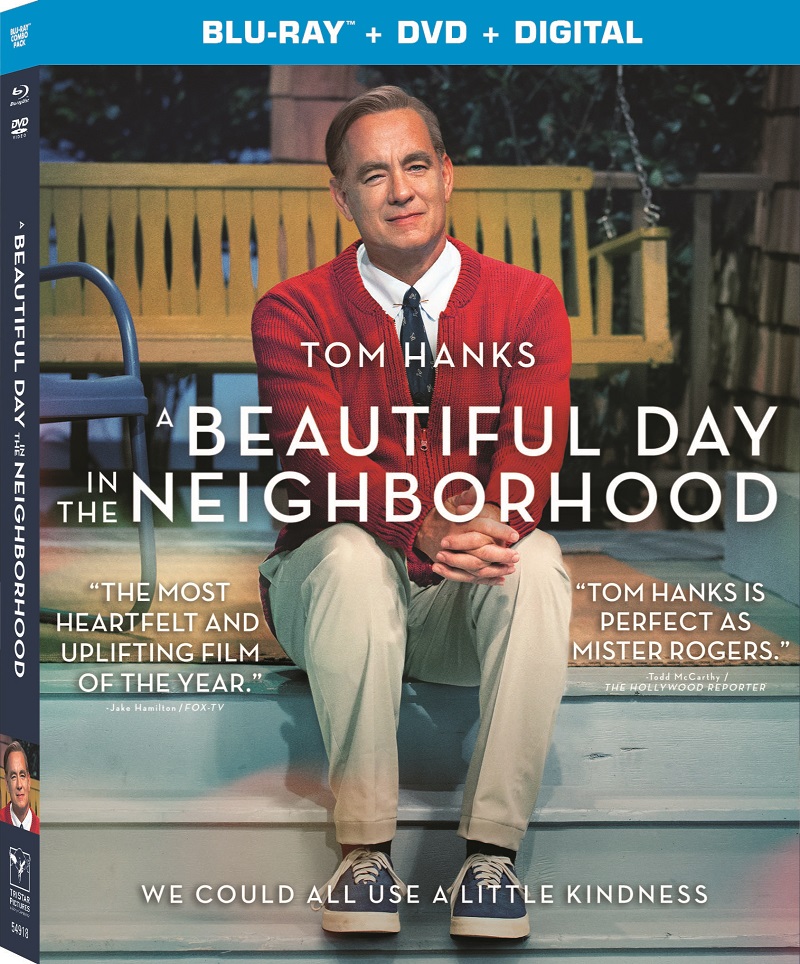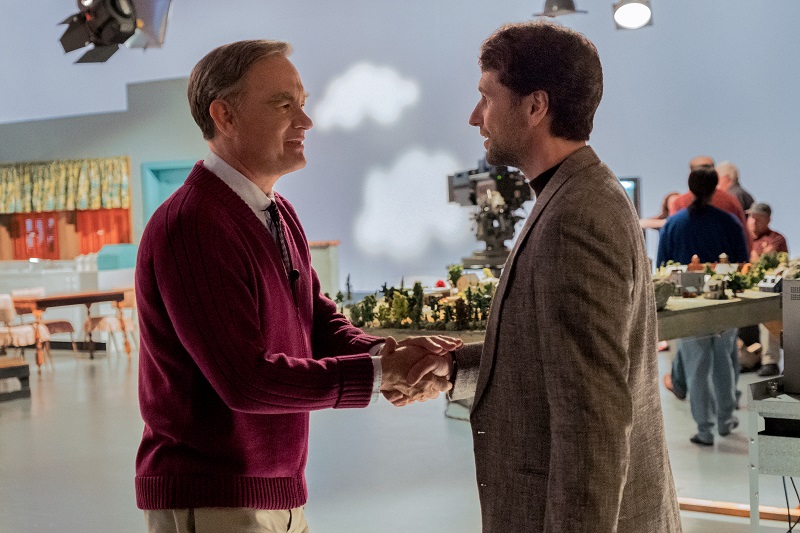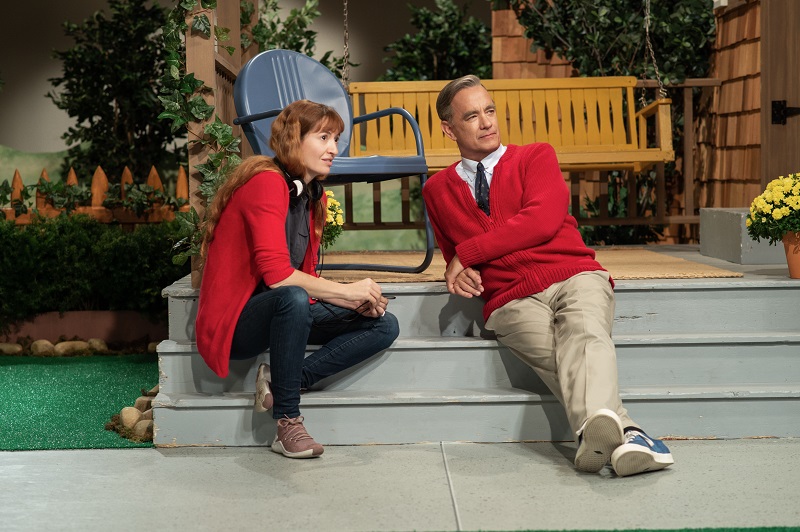Lloyd Vogel (Matthew Rhys of The Americans acclaim) is an Esquire journalist who is tasked by his editor with penning a short piece on Fred Rogers (Tom Hanks) for an upcoming issue that spotlights American heroes. In Marielle Heller’s A Beautiful Day in the Neighborhood (out now on all home video formats), it is made crystal clear that Vogel is not necessarily a fan of Mr. Rogers or his children’s television program that has influenced countless souls since it debuted in February of 1968.

Now, it’s not that Vogel doesn’t like Rogers or his show. It has simply escaped his radar and we learn, for good reason. When he informs his wife, Andrea Vogel (Susan Kelechi Watson), who his next profile is, with one line she encapsulates all viewers need to know about where her husband is coming from. She utters, “please don’t ruin my childhood.” That and the fact that of all the heroes that Esquire is profiling, Mr. Rogers was the only one who would sit down with the reporter. Lloyd believes it is his mission as an investigative reporter to get to the bottom of every person and story. As such, many of those he has profiled do not come off all that great.
Thing is, his editor, Ellen (Christine Lahti), hits the nail on the head when she says that she believes that Lloyd needs this assignment.
Fresh off the heels of last year’s documentary Won’t You Be My Neighbor, the script by Micah Fitzerman-Blue and Noah Harpster achieve utter brilliance with their storyline that gives us entry into the icon’s life, but not through traditional biopic means. Everything audiences need to know about Fred Rogers and his impact on culture and more importantly—children—is encapsulated in every single piece of dialogue and plot that makes up A Beautiful Day in the Neighborhood.
By utilizing Lloyd as our entry point into Rogers’ world and his impact, our film makes it about one person, one moment and one emotive storm that is Vogel’s world. On the other side of that coin is the legendary children’s television figure. Because the weight of Lloyd’s emotional baggage is much heavier than what was teased in the A Beautiful Day in the Neighborhood trailer, I won’t delve into too much about it and the relationship that builds over several meetings between Rogers and the magazine writer. But this much can be stated, the fact that this is a true story—based on the life of reporter Tom Junod—makes it even more extraordinary that this snippet of Fred Rogers, a Presidential Medal of Freedom award winner, was screenwriters “way in” to telling the Rogers tale. By centering a story around the seismic impact that the man had on one individual, the film’s stunningly captures the essence and power of his mere existence.
This flick’s on there, what else made our top 19 of 2019?
Hanks, in what should be surprising to no one, is transcendent as the American icon, and yes … hero. He inhabits Rogers in so many ways and makes a slew of portrayal choices that further show his thespian brilliance.
It is a true gift to witness Hanks’ mastery of character, but also his keen understanding of his place in this specific narrative. It’s easy to see why he was touted as a Best Supporting Actor candidate for awards consideration. This is Rhys’ movie, in terms of carrying the dramatic momentum and weight. He is as much a gift to Rogers’ legacy as Hanks. With what he achieves in A Beautiful Day in the Neighborhood, his cinematic future is blindingly bright.

Meanwhile, Watson is also not simply the supportive wife to Rhys’ husband. She is his biggest cheerleader, yes, but brazenly calls him on his BS and never holds his hand as he goes through an emotional tsunami. She’s a new mother, who is painted as supremely intelligent and doesn’t have the time or headspace—with a newborn—for her husband’s psychologically stunted reality. Instead, she provides him with a raw reality that only a soulmate/partner can impeccably provide. With Watson wielding her thespian power, it comes off as frankly, inspiring. Then, there’s Chris Cooper, always one of our most gifted performers. He had a difficult needle to thread as Jerry Vogel, Lloyd’s father. Cooper does so with a panache that adds so much to the overall tone of the film.
Heller, fresh from last year’s supremely stellar Can You Ever Forgive Me?, has made another stunning step forward in her career with A Beautiful Day in the Neighborhood. Working closely with her behind-the-scenes team, there are some risky filmmaking choices that she made that could not have paid off more.
When it comes to the bonus features there are over 15 minutes of additional scenes, never seen before now. Among them are Heroes Must Die, You Just Had a Full Interview, Mr. Rogers’ Archives, A Trip to the Hospital, Are You Still Feeling Agitated, Did You Know About Me?, I Asked You for Two Photographs and Mitzi. Each provides a priceless window into the creative mind of the director. Why she included what she included speaks volumes about her as a filmmaker and these deleted scenes will showcase an artist just commencing her artistic excellence.
The People Who Make a Neighborhood: The Making Of is the making-of featurette that takes us inside Heller’s moviemaking magic. In a fascinating way of going about telling the story of how this true tale came to life on the screen, it features Hanks, in character, introducing the creative folks who proudly worked their tails off to bring Rogers’ importance to the masses. The just over 15-minute featurette features many from the cast as well and a fascinating look at how they were granted permission to shoot on Rogers’ Pittsburgh-famed stage at his old home at WQED.
Rogers was as known for his puppets as he was his self-penned songs. Dreaming Big, Building Small: The Puppets & Miniatures is a delightful bonus feature that looks at how the production managed to so brilliantly recreate Rogers’ puppets that inhabit his educationally fictional Neighborhood.

Daniel Tiger Explains: Practice Makes Perfect is a terrific way of bringing new life to the old blooper reel. The famed Daniel Tiger gives us the anchor for a look at some of the funnier missteps from the filming of the Oscar nominated flick. There is a straightforward blooper reel as well.
Any fan of the two-time Oscar winner will want to dive into Tom Hanks as Fred Rogers as soon as those credits stop rolling. The ten-minute look at how Hanks brought an icon and one of the most recognizable people he has ever played to life is a terrific look at a master working his craft. He stresses how he found and did not replicate the “character.” He had to put his own spin on one of the most famous people on the planet and it’s easy to see that he succeeded beyond anything we could have dreamt of him achieving.
Director Heller is joined by her Director of Photography Jody Lee Lipes for the audio commentary track. What is so special about this particular commentary is how the filmmakers each go deeper, in terms of perspectives of Rogers’ influence and societal impact, and how they wove that into the tapestry that is their absolute gem.
Film Grade: A+
Bonus Features: A

